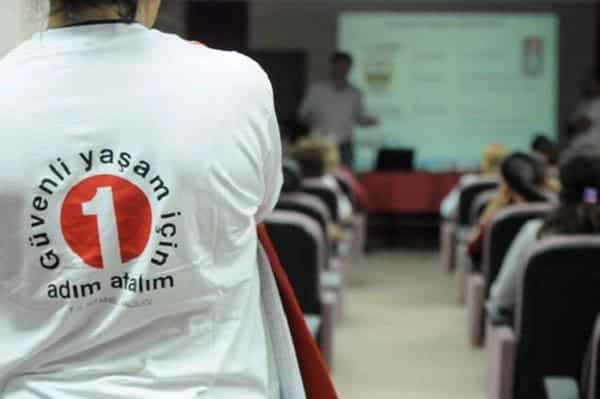It’s the kind of story that sweeps down the gossip chain, becoming so popular that it morphs into an urban legend. The tale retold whenever the subject of possible earthquakes becomes a bit too heavy. Over the years different plot twists have emerged for the tragic-comic legend, but it goes something like this. It’s 2011 in Japan, and people are going about their daily routine. Suddenly, a magnitude nine earthquake shatters the peace of the day. Most Japanese people know the drill and take safe positions, waiting out the huge tremors. However, one (allegedly Turkish) man panics and, much to the shock of those holding on around him, decides he’d rather take his chances jumping out the window. This attempt at human flight leaves him the only one injured in that area.

We all may wonder at some time or another how we’d react in this worst case scenario, and hope to have a less embarrassing and safer outcome than the famed Turk in Japan. With that aim in mind, it’s essential for everyone living in Turkey, especially in Istanbul, to know the risks, precautions, and post-quake steps to take in case the earthquake that experts continue to threaten actually happens.
They are right to warn us. Istanbul sits on the North Anatolia Fault which has caused major earthquakes in the past, and is likely to do so in the near future.
How to be better prepared:
- Check that your house or apartment has the earthquake-safe approval certificate. The owner of the building should have this document. If not, you can also check from the local municipality offices where the information is kept on file. This document shows that the building meets new safety standards and is less likely to collapse in the event of an earthquake.
- Choose a safe meeting point. This area should be easily accessible and in an open area, away from any tall buildings. For those living near the coast, a high ground area should be chosen. Istanbul’s fault runs under the water of the Marmara Sea along the coast, so there is even a tsunami risk with earthquakes of magnitude 7.5 and higher.
- Prepare an emergency backpack. This should include a first aid kit, a knife, bottled water (about two liters per person per day), three days’ worth of food (non-perishable and energizing), a flashlight, a battery-powered radio, copies of important identity documents and telephone numbers in a waterproof pouch (such as passport, residency permit, and emergency contacts), medicine (if needed), a highlighter, an emergency blanket and anything you may need for your children.
- Keep an emergency information card in your wallet. This should be in Turkish so that aid workers can provide help as quickly as possible. The information should include your name, blood type, identification number, address, emergency contact, any medical conditions or allergies, and the family meeting point. A downloadable card is available at Güvenli Yaşam.
- Hunt for hazards around your house and fasten any moveable objects. Many people are injured during an earthquake due to falling objects and broken windows. About 50 percent of injuries in Turkey arise from non-structural hazards. To protect against these risks fasten furniture like bookcases and wardrobes to the wall with tools which are readily available at most hardware stores. A quick way to test if something may be dangerous is to attempt to shake it yourself. If you can make it wobble, then an earthquake certainly will. Also, move chairs, sofas and beds away from windows, so people are less likely to be near them in case of an earthquake.
- Know the emergency plan of your place of work. All businesses are required to have an emergency plan by 2016, including evacuation and meeting point procedures.
During the earthquake:
- Do not panic. Staying calm during an earthquake is crucial to avoiding injury. People should stay put. Do not move around the room, try to go downstairs, go out windows or onto balconies, or use the elevator.
- Ready yourself in the first two to three seconds. Earthquakes begin with a warning tremor before the full strength quake begins. In these two to three seconds, remember to drop, cover and hold. Crouch to the ground, cover your head and neck and grab onto something stable. Also, keep your face covered to protect your eyes from flying debris. If outside, move away from tall buildings.
- Wait it out. Remain in the covered position until the earthquake ends. Try to keep your mind occupied by counting until the quake finishes.
Right after the earthquake:
- Check for injuries. Using caution, check if you or anyone around you may need first aid or more serious medical attention.
- Beware of gas leaks. Do not turn on the lights or light matches until you are sure there is no gas leak in the area.
- Get away from coastal areas. If you are near the Marmara coast, you should move to high ground as quickly and safely as possible. Tsunami waves of at least five meters are expected to follow any strong earthquakes in Istanbul.
- Move out of the building. When exiting the building, take your time and be aware of any hazards.
- Avoid using the phone lines. During emergency situations when everyone tries to make phone calls, the system collapses. Instead try sending text messages or posting to social media using phone internet packages. It is also possible that you will be able to call points outside of the city after the quake.
- Be mindful of possible aftershocks. These can also be quite powerful and may require taking the safety position again.
- Stay away from dangerous areas. These include downed power lines and damaged buildings.
During the first 72 hours post-quake:
During this period, it is likely that emergency personnel may not be able to reach all people in the city who need assistance. There are steps you can take during this time to stay safe.
- Wear sturdy shoes and durable clothing.
- Listen to the radio for emergency information on 103 FM.
- Find safe shelter. Do not reenter your building until it has been declared secure.
- If possible, contact your consulate.
For those who are interested in learning more about how to prepare for an earthquake, free educational publications are available from Istanbul AFAD, the Disaster and Emergency Management Authority of Turkey. These materials can be downloaded at Güvenli Yaşam. This organization also offers free training for earthquake readiness. There are three sessions which include basic safety, first aid and volunteer search and rescue instruction. English classes are available for group requests. Call 0212 455 56 00 or go to the webpage for further details.
Special thanks to Sennur Ulugönül, Disaster Management Specialist, Eralp Erdoğan, Disaster Management Specialist, and the workers at Beyaz Gemi.
Meridith Paterson is a traveler, writer and teacher who has been wandering around Istanbul for six years now. More of her musings and stories can be found at her website.
This article was originally published on October 20, 2014, by author Meridith Paterson.








